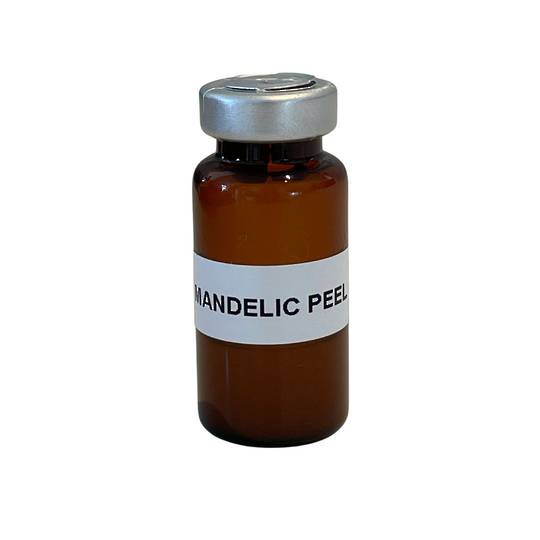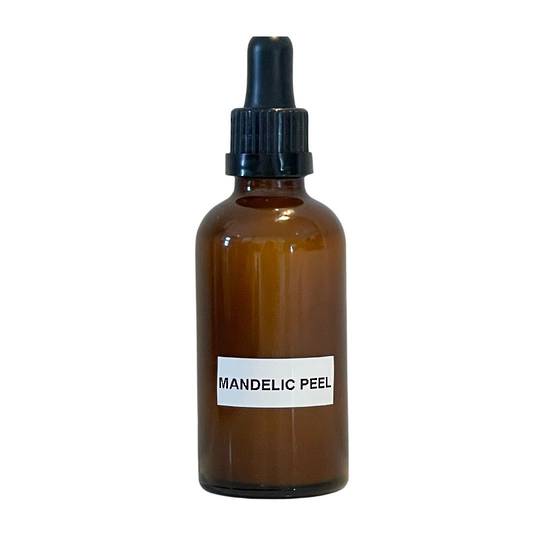- Track your orders
- Save your details for express checkout
- Join our loyalty points scheme and receive points and future discounts with every purchase
Mandelic acid is a member of the class of chemical compounds known as alpha hydroxy acids (AHAs). These compounds consist of a carboxylic acid (-COOH) substituted with a hydroxyl group (-OH) on the adjacent carbon in the alpha position, hence the name. AHAs can be naturally derived from fruit and milk sugars or synthetically produced. For example, mandelic acid can be isolated from natural sources like apples, bitter almonds, and wild cherries.
AHAs are popular ingredients in skin care products because they have the ability to exfoliate the skin, stimulate the skin’s natural regeneration process, and help the skin to retain moisture. Other AHAs include lactic acid, glycolic acid, tartaric acid, malic acid, and citric acid. So what makes mandelic acid unique? One thing is its molecular size. In skin care, molecular size matters because the smaller a molecule, the more easily it gets into the skin. For example, glycolic acid is the smallest AHA, which means it penetrates the skin better and faster than all of the others. This is why glycolic acid is considered to be the strongest AHA. However, stronger doesn’t always equal better. Glycolic acid may be too strong for some skin types, leading to skin irritation, redness, and swelling. This is why mandelic acid is an excellent option for those with sensitive skin and for those who have never exfoliated with an AHA before.
Like many AHAs, mandelic acid offers numerous benefits to the skin, such as exfoliating, smoothing rough texture, increasing skin hydration, providing anti-aging benefits, and helping to prevent acne. Below we’re giving you the details on exactly how mandelic acid benefits the skin.
Gently exfoliates
As a class, AHAs are well known to be excellent chemical exfoliants, and mandelic acid is no exception. Mandelic acid acid exfoliates the skin by targeting corneocytes (dead skin cells that make up the top layers of skin) in a process called corneocyte desquamation. By enhancing their breakdown and increasing the separation of skin cells, the rate of cell turnover is increased, leading to smoother, brighter skin. As mentioned above, mandelic acid’s large molecular size means it penetrates the skin slowly and has a low risk of causing irritation.
Provides anti-aging benefits
AHAs, including mandelic acid, have also been found to stimulate collagen production. Collagen is a structural protein naturally produced by the body that is responsible for keeping skin strong and firm. Collagen production starts to decline around age 25 and continues to decrease with age. Collagen levels also decrease due to factors such as smoking, sugar consumption, and overexposure to the sun’s ultraviolet rays. Ultimately, this decrease leads to wrinkles and sagging skin. Even though many skin care products include collagen as an ingredient, it is simply too large to penetrate the skin deep enough to have an anti-aging effect. This is why using ingredients that can penetrate the skin and stimulate collagen synthesis, such as mandelic acid, provide effective anti-aging benefits. Mandelic acid firms the skin, which helps to reduce the appearance of fine lines and wrinkles.
Draws moisture into skin
Some people skip exfoliating in their skin care routine because they fear doing so will cause dryness and irritation. Fortunately, the AHAs have the ability to exfoliate the skin while boosting skin hydration. Remember, AHAs have a hydroxyl (-OH) group in the alpha position. This hydroxyl group enables AHAs to function as humectant moisturizers. A humectant moisturizer is an ingredient that sits on your skin and grabs onto water, slowing it from evaporating. This keeps your skin hydrated, while also temporarily giving the skin a “plump” appearance.
Helps prevent acne
Due to its exfoliating effects, mandelic acid is known to help prevent acne. Blemishes form due to excess sebum, dead skin cells, and bacteria clogging pores, followed by inflammation and swelling. Mandelic acid sloughs away the dead skin cells that can clog pores and cause acne breakouts. In addition, its moisturizing effects keep the skin hydrated and soft, allowing blemishes to heal better.

